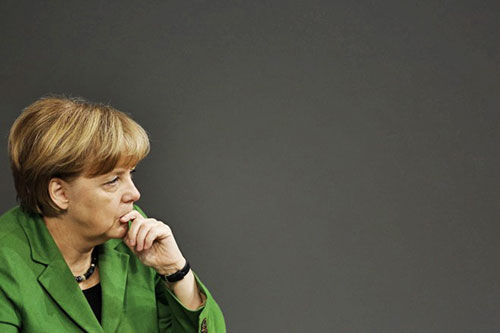|
from TheIntercept Website
German Chancellor Angela Merkel
One of the more bizarre aspects of the last nine months of Snowden revelations is how top political officials in other nations have repeatedly demonstrated, or even explicitly claimed, wholesale ignorance about their nations' cooperation with the National Security Agency, as well as their own spying activities.
This has led to widespread speculation about the authenticity of these reactions:
In Germany, when Der Spiegel first reported last June that the NSA was engaged in mass spying aimed at the German population, Chancellor Angela Merkel and other senior officials publicly expressed outrage - only for that paper to then reveal documents showing extensive cooperation between the NSA and the German spy agency BND.
In the Netherlands, a cabinet minister was forced to survive a no-confidence vote after he admitted to having wrongfully attributed the collection of metadata from 1.8 million calls to the NSA rather than the Dutch spying agency.
In the UK, Chris Huhne, a former cabinet minister and member of the national security council until 2012, insisted that ministers were in "utter ignorance" about even the largest GCHQ spying program, known as Tempora,
A similar controversy arose in the U.S., when the White House claimed that President Obama was kept 'unaware' of the NSA's surveillance of Merkel's personal cell phone and those of other allied leaders.
Senate Intelligence Committee Chairwoman Dianne Feinstein claimed the same ignorance, while an unnamed NSA source told a German newspaper that the White House knew.
A new NSA document published today by The Intercept sheds considerable light on these questions. The classified document contains an internal NSA interview with an official from the SIGINT Operations Group in NSA's Foreign Affairs Directorate.
Titled "What Are We After with Our Third Party Relationships? - And What Do They Want from Us, Generally Speaking?", the discussion explores the NSA's cooperative relationship with its surveillance partners.
Upon being asked whether political shifts within those nations affect the NSA's relationships, the SIGINT official explains why such changes generally have no effect:
The official adds that there,
He gives two examples:
In general, however, many of these "relationships have, indeed, spanned several decades" and are unaffected by changes due to elections, in large part because the mere existence of these activities is kept from the political class.
The implications for democratic accountability are clear.
In an October Guardian op-ed, Huhne, the British former cabinet minister, noted that,
Detailing what appears to be the systematic attempt to keep political officials in the dark, he wrote:
The dangers posed by a rogue national security state, operating in secret and without the knowledge of democratically elected officials, have long been understood.
After serving two terms as president, Dwight D. Eisenhower famously worried in his 1961 Farewell Address about the accumulated power of the,
He urged citizens:
A secret GCHQ memo, reported by the Guardian in October, demonstrates that the agency's primary motive for concealing its surveillance activities is that disclosure could trigger what it called "damaging public debate," as well as legal challenges throughout Europe.
Those fears became realized when, in the wake of Snowden revelations, privacy lawsuits against the agency were filed in Europe, GCHQ officials were forced to publicly testify for the first time before Parliament, and an EU Parliamentary inquiry earlier this year concluded NSA/GCHQ activities were likely illegal.
The British agency was also concerned about,
...given that such disclosures could make citizens in other countries aware, for the first time, of their government's involvement in mass surveillance.
The revelations of a global system of blanket surveillance have come as a great surprise to hundreds of millions of citizens around the world whose governments were operating these systems without their knowledge.
But they also came as a surprise to many high-ranking political officials in countries around the world who were previously ignorant of those programs, a fact which the NSA seems to view as quite valuable in ensuring that its surveillance activities remain immune from election outcomes and democratic debate.
Document published with this article:
|

